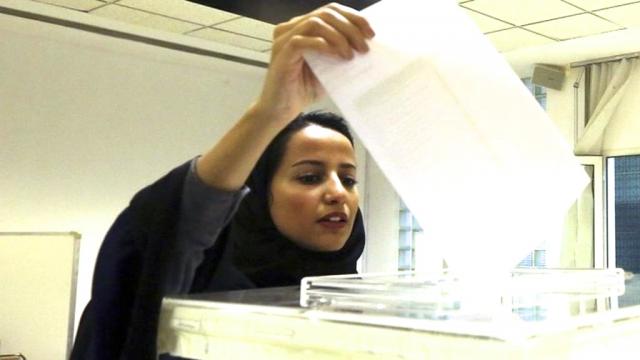
Saudi Arabia has elected its first female local councillors in a historic step for a country where women are banned from driving and face routine discrimination.
Results from Saturday’s municipal council elections indicated there were about 17 female winners. These included four in Jeddah, one near Mecca – home to Islam’s holiest site – and others in Tabuk, Ahsaa and Qatif. Several more, reported by al-Sabq online newspaper, were expected to be confirmed later.
Rasha Hefzi, a prominent businesswoman who won a seat in Jeddah, thanked all those who supported her campaign and trusted her, pledging: “What we have started, we will continue.” Hefzi and other candidates used social media to contact voters because of restrictions on women meeting men and bans on both sexes using photographs.
The turnout, estimated to be about 25%, was low, as was registration. Only 1.32 million men and 130,000 women out of a population of 20 million voted – figures that highlight the unfamiliarity of the democratic process of election in the absolute monarchy.
But there was surprise at the number of women who took seats. “I think it’s great that several women won in different regions of Saudi Arabia,” said writer Maha Akeel. “It shows how much Saudi society has progressed on the issue of not only accepting, but actually supporting women in public office, and this could mean that more change is to come. I’m surprised. We expected maybe one or two women would win.”
Local elections were held in 2005 and 2011, but this was the first time women were allowed to take part. The powers of municipal councils are limited to advising local government and helping oversee budgets, but the election has still been hailed by women activists as a crucial first step towards achieving wider rights and broadening the understanding of civic engagement.
“I don’t consider winning to be the ultimate goal,” said the Riyadh-based historian Hatoon al-Fassi, coordinator for the grassroots Saudi Baladi initiative, which worked to raise voter awareness and increase female participation. “But it is the right of being a citizen that I concentrate on and I consider this a turning point.”
No candidates addressed the broader issues of democracy, human rights or the role of sharia law and punishments, which attract so much attention abroad. Saudis who boycotted the poll dismissed it as window dressing, arguing that real the power rests firmly with the royal family, the religious establishment and male ministers.
Women have previously been appointed to the Shura (consultative) council and hold senior positions in business and academia. Salima bint Hazab al-Otaibi won a council seat in the Mecca district of Madrakah, where all the other successful candidates were men.
Lama al-Sulaiman, a prominent British-educated biochemist and vice-president of the Jeddah chamber of commerce, also won in Jeddah, alongside 10 male candidates. “We have reached a point where a lot of us believe we need to progress, irrespective of sharia law,” she said last week. “Everyone wants to improve their living standards.”
Hanuf al-Hazmi, elected in the Jawf region, said in an interview with a local news website that she would make a special effort to deal with women’s issues, focusing on childcare, youth centres, roads, rubbish collection and parks.
Official Saudi media have been promoting the election and the participation of women, which was ordered by the late King Abdullah in 2011 as part of the response to Arab spring unrest across the region. Even critics of the Al Saud ruling family say they are pleased that the pledge was carried through by his more conservative successor, King Salman.
Before it was announced that women would take part in this year’s polls, the country’s grand mufti, its most senior religious figure, described women’s involvement in politics as “opening the door to evil”. Opposition among hardline clerics is still strong.
“Now women have a voice,” Awatef Marzooq told the Saudi Gazette on Saturday after casting her ballot for the first time at a Riyadh school. “I cried. This is something that we only used to see on television taking place in other countries.”
Mohammed Al-Shammari, who had just dropped off his daughter, a teacher, said he had encouraged her to vote. “We want to break this barrier. As long as she has her own place and there is no mixing with men, what prevents her from voting? We support anything that does not violate sharia.”
For all the excitement, Saudi women are still banned from driving and are required to cover themselves in public. They are subject to other routine restrictions including the permission of a male guardian to leave the country.
3 WAYS TO SHOW YOUR SUPPORT
- Log in to post comments













